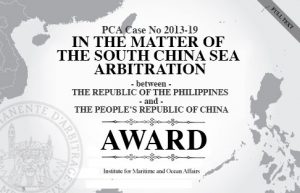 In Hygienic Packaging Corporation v. Nutri-Asia, Inc., Doing Business under the Name and Style of UFC Philippines, G.R. No. 219708, January 23, 2019, the Supreme Court, Third Division, ruled that there is no arbitration agreement when the evidence fails to show that the parties entered into a contract to submit future disputes to arbitration.
In Hygienic Packaging Corporation v. Nutri-Asia, Inc., Doing Business under the Name and Style of UFC Philippines, G.R. No. 219708, January 23, 2019, the Supreme Court, Third Division, ruled that there is no arbitration agreement when the evidence fails to show that the parties entered into a contract to submit future disputes to arbitration.
On July 22, 2009, Hygienic Packaging Corporation (“Hygienic”) commenced suit to collect a sum of money against Nutri-Asia, Inc. (“Nutri-Asia”). The case was filed with the Regional Trial Court, Manila (“RTC”) pursuant to a venue stipulation in the Sales Invoices issued by Hygienic and signed by Nutri-Asia.
In its Answer, Nutri-Asia argued that the case should be dismissed as Hygienic failed to first refer the matter to an Arbitration Committee, as provided under the Terms and Conditions of the Purchase Orders issued by Nutri-Asia and signed by Hygienic. Nutri-Asia later filed an Omnibus Motion, which the court denied, holding that the venue was properly laid and that the signatures of Nutri-Asia’s representatives in the Sales Invoices indicated Nutri-Asia’s concurrence that any dispute would be raised before the courts in Manila.
Arbitral Awards and the Apostille Convention
By Jose Maria B. Buenagua
For Stephen Stern and Sloan Zarkin, legal practioners in New York, arbitration beats litigation.
In their article “Why Arbitration Beats Litigation for Commercial Disputes,” published in 2015 in GPSolo Vol. 32, No. 1 by the American Bar Association, Stern and Zarkin opine that “Business clients, as a general rule, are cost conscious. They need results quickly… The key is the control the client can exercise over the entire process.” Arbitration, as the modern tool for peacemaking and negotiation, generally and efficiently satisfies just that.
While arbitration appears to be a new dispute resolution tool, its legislative history in the Philippines traces its roots as far back as 1953 with Republic Act No. 876 or The Arbitration Law.
New York Convention
A few years after, on June 10, 1958, Philippines became a signatory to the Convention on the Recognition and Enforcement of Foreign Arbitral Awards or simply, the New York Convention. It has been described as the most important and successful United Nations treaty in the area of international trade law.
Renaud Sorieul, the Secretary of United Nations Commission on International Trade Law (UNCITRAL) has called it “the cornerstone of the international arbitration system” [Herbert Smith Freehills, Inside Arbitration Vol. 6, (2018)]. Professor Gillian Triggs, a retired dean of Sydney Law School, calls the New York Convention as “the success story of public and private international law” (The Australia ADR Reporter, 2008).
 According to Linda Silberman, a New York University Martin Lipton professor of law, “one can only marvel at the success of the New York Convention over its fifty-year span” (Linda Silverman, The New York Convention After Fifty Years: Some Reflections on the Role of National Law, Georgia Journal of International and Comparative Law, 2009).
According to Linda Silberman, a New York University Martin Lipton professor of law, “one can only marvel at the success of the New York Convention over its fifty-year span” (Linda Silverman, The New York Convention After Fifty Years: Some Reflections on the Role of National Law, Georgia Journal of International and Comparative Law, 2009).
Indeed, 61 years after the Philippines became a signatory to the New York Convention, much has changed. Today, there are 159 contracting parties to the New York Convention, a testament to its
modern legal prowess.
Recognition and Enforcement Under the New York Convention, arbitral awards issued in the Philippines in a domestic or international arbitration may be enforced abroad. Article I of the Convention states that it shall also “apply to arbitral awards not considered as domestic awards in the State where their recognition and enforcement are sought.” Arbitration, in this sense, applies not only to those made by arbitrators but also those made by permanent arbitral bodies to which the parties may have submitted their disputes.
As in domestic laws however, there are formal requirements under the Convention before an arbitral award may be enforced. Enforcement here may be made in the states of the contracting or even non-contracting parties of the Convention. For the enforcement of the arbitral award in a contracting state of the Convention, Article III mandates that “each contracting state shall recognize arbitral awards as binding and enforce them in accordance with rules of procedure of the territory where the award is relied upon.” It also mandates that no substantial or onerous conditions be imposed in the recognition and enforcement of the arbitral award.
In addition, Article IV of the Convention requires the following formal requirements for recognition and enforcement:
1. The duly authenticated original award or a duly certified copy thereof
2. The original agreement referred to in Article II or a duly certified copy thereof.
Finally, the Convention requires that the arbitral award be in the official language of the country where the award will be recognized and enforced. Should there be a need for a translation, the translation shall be certified by an official or sworn translator or by a diplomatic or consular agent.
Reservations and Refusal to Enforce
An arbitral award may be refused recognition and enforcement only when it is part of the reservation of the contracting state or it is among the grounds mentioned in the Convention’s Article VI.
A reservation on the Convention may be based on a Territorial Reservation, Commercial Reservation, or a Reciprocity Reservation. A Territorial Reservation limits the recognition and enforcement of the arbitral award to a member state. A Commercial Reservation allows a contracting state to apply the Convention only to those it considers as a “commercial” transaction. Lastly, Reciprocity Reservation is based on the reciprocal rights an enforcing state grants to other contracting state.
Next issue: Procedure for authentication of arbitral awards before and after the Apostille Convention
About the Author Jose Maria Buenagua or JM is currently an associate of Castillo Laman Tan Pantaleon & San Jose law offices. He holds a licentiate degree in Philosophy and finished his Juris Doctor from Ateneo de Manila University School of Law.
